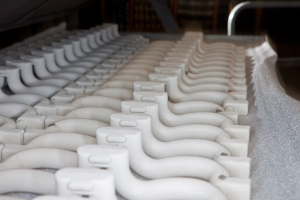By themselves, the molds produced for sand casting and permanent mold casting can produce complex, precise solid pieces of metal. For many applications, however, a solid piece of metal isn’t good enough. That is where casting cores come into play.
What are casting cores?
For many of the parts manufactured in our foundry, complexity on the outside is less importance than complexity on the inside. When you are manufacturing something with the interior complexity and necessary precision of a leak-tight braking component your casting requires hollow areas within the part. The casting cores provide these. They are placed inside of the mold before the two halves are joined together, shaping the interior of the part during the pouring and cooling process the same way the mold shapes the outside.
We create our cores from a mixture of sand and a bonding agent. This allows them to be broken up and “poured” out of the part after the part has hardened. At LeClaire Manufacturing, we have the facilities to support multiple different core-creation processes. This lets us choose the method that is going to create the best core for the job at hand rather than being constrained by our machinery to use the same method every time.
Want more information about our core-making process, from the steps involved to the difference between hot-box and cold-box core creation? Click here to learn more.
Why Quality Cores Are Important
 When it comes to cores, both the quality of the core and the quality of the technicians using them are crucial. If the core is constructed poorly, it might break or otherwise fail during the pouring process. In cases where it isn’t placed exactly right, the product will be malformed. If it isn’t secured correctly, it could shift during the pouring or cooling phase.
When it comes to cores, both the quality of the core and the quality of the technicians using them are crucial. If the core is constructed poorly, it might break or otherwise fail during the pouring process. In cases where it isn’t placed exactly right, the product will be malformed. If it isn’t secured correctly, it could shift during the pouring or cooling phase.
Every time this happens, it slows down the production process, reducing efficiency and increasing costs.
This is even more crucial for highly technical products that require multiple cores. Some engines require five cores per casting. That leak-tight brake component component mentioned earlier? It required 21. If even one of those fails, the part is no good.
That is why you should turn to a foundry that has experience working with highly technical cores and the quality equipment to back that up.
Turn to LeClaire for Your Aluminum Casting Needs
At LeClaire, we are experts at each part of the casting process because we take part in every step, ensuring that our castings meet the precise needs of our clients. Contact us today to request a quote.

